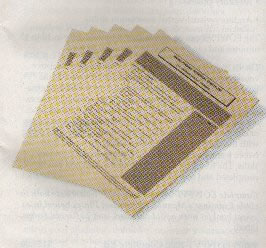The Individuals
with Disabilities Education Act (IDEA) recommends that the IEP team and
other qualified professionals include classroom based observations in
the evaluation of children. The Word Finding Referral Checklist (WFRC)
(German and German, 1993) can be used to obtain these classroom based
observations in Word Finding. This can be accomplished for learners with
Word Finding difficulties by interviewing classroom teachers and observing
in the learner's classroom using the WFRC.
The Word Finding Referral Checklist (WFRC) (German and German, 1993) is a focused observation
form listing 12 Word Finding behaviors typical of learners displaying
Word Finding difficulties in academic settings. To use the WFRC, specialists
begin by asking classroom teachers whom in their classroom might be displaying
Word Finding difficulties. Together they discuss the characteristics on
the WFRC and then the classroom teacher observes his or her students to
identify who might display Word Finding characteristics targeted on the
WFRC. This process is helpful in substantiating the presence of Word Finding
difficulties in the classroom setting. Learners who display the Word Finding
behaviors on this survey are selected for deep assessment in Word Finding
using the Test of Word Finding, Second Edition (TWF-2). The WFRC is highlighted
in the table below.
|
Word
Finding Referral Checklist (WFRC)
(German & German, 1993)
 |
The
WFRC focuses users' attention on three areas by providing specific
behaviors typical of good language comprehension, typical of word
finding difficulties in single-word contexts, and typical of word
finding difficulties in discourse contexts. The WFRC doubles as a
guide to inservice classroom teachers and parents in the area of child
word finding. Packet of 25 is $29.95 |
Word
Finding Materials, Inc.
5840 Teal Lane
Long Grove, Il 60047
Click
here to order. |
Back to top
Observations
Gleaned from more General Language Assessments and Reading Materials.
Noting learners oral responses on subtests of more general language measures
can provide examiners with information about learner's Word Finding skills.
For example, observing student's performance on sub tests that assess
rapid automatic naming (RAN) can provide insights into a learner's word
retrieval skills. These tasks require learners to quickly name pictures
of either familiar objects (Wiig, Semel, & Nystrom, 1983); color words
(Mardell-Czudnowski & Goldenberg, 1998); color words and shapes (Semel,
Wiig, & Secord, 2003), or alternating printed letters, numbers, and
objects (Wolf & Denckla, 2005). Learners who are slow retrievers may
demonstrate naming difficulties on these naming tasks. When slow naming
behavior is observed, these learners may be at risk for having naming
speed deficits and would benefit from a comprehensive evaluation of their
Word Finding skills.
Further, although speed difficulties may suggest Word Finding problems,
fast namers on these same tasks do not rule out underlying Word Finding
difficulties. For example, it is possible for intermediate grade students
with Word Finding difficulties to do well on RAN measures while still
having difficulty retrieving academic vocabulary in school. In these situations
these students also need deep assessment in Word Finding as presented
in the assessment section of this web site.
|
